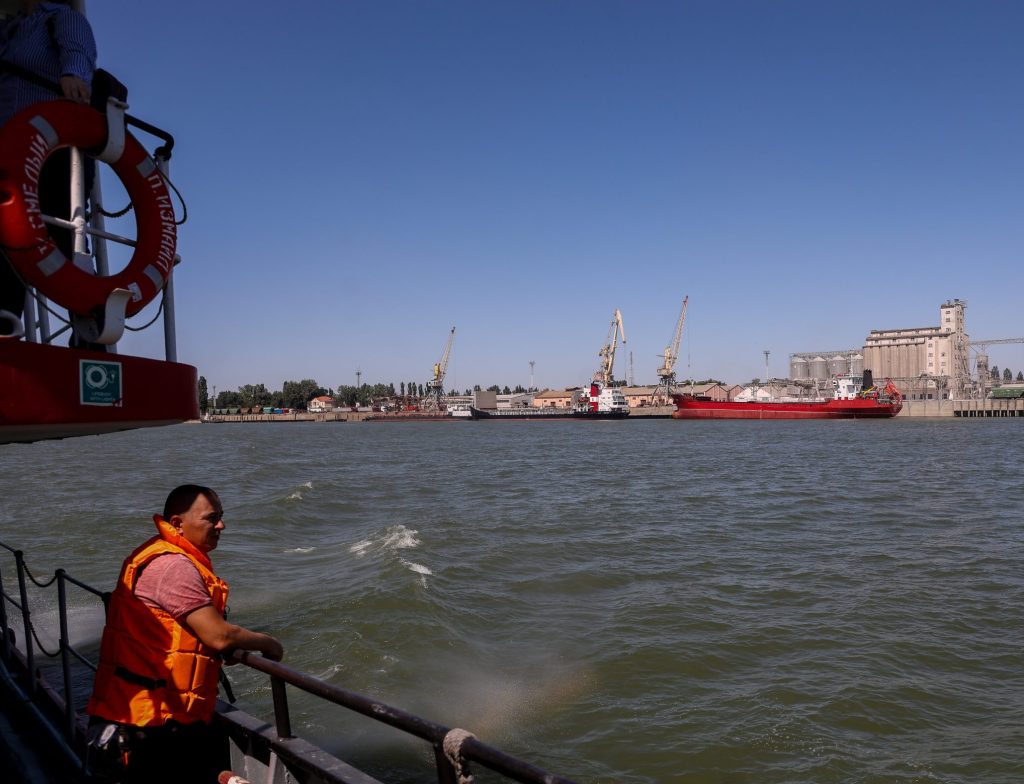Ukrainian President Volodymyr Zelensky visit on October 10 in Bucharest took place at a critical moment for cooperation between Ukraine and Romania. This follows months of increasingly intense diplomatic engagement, focused on alternative transportation corridors for Ukrainian grain. This intensified dialogue highlights the growing importance of Ukraine’s Danube ports in the war against Putin’s Russia.
Since July 2023, Russian rockets and drones have been raining down relentlessly on the Ukrainian port cities of Izmail and Reni. With Russia’s withdrawal from the UN-brokered grain deal on July 17 and continued efforts to block Ukraine’s Black Sea ports, these small towns on the Danube have been thrust into the spotlight as alternative gateways for Ukrainian grain and other agricultural products destined for global markets.
Although the Danube route offers many benefits to Ukrainian exporters, major challenges persist. An underestimated problem is the past neglect of the Danube region by the Ukrainian authorities in kyiv. With Russian air raids and naval mines, the legacy of this neglect now threatens to undermine Ukraine’s efforts to thwart Russia’s blockade of the Black Sea.
Subscribe to UkraineAlert
As the world follows Russia’s invasion of Ukraine, UkraineAlert delivers the Atlantic Council’s best opinion and expert analysis on Ukraine twice a week, straight to your inbox.

The towns of Reni and Izmail span 112 kilometers of the Kiliya branch of the lower Danube, which forms the border between Ukraine and Romania. Both cities are located in one of the most ethnically diverse and isolated regions of Ukraine. Known historically as Bessarabia, this isolated region lies south of Odessa, Ukraine’s largest port city on the Black Sea, and has few land connections with the rest of the country.
Since Ukraine regained its independence in 1991, Bessarabia’s informal method of governing has generally been to let local businesses and political elites maintain control. In return, members of the local establishment are expected to provide political support to those who hold power in kyiv. For example, leadership in the town of Izmail has not changed much since 2010, with local authorities simply changing their name to reflect each successive change in the national government.
This implicit agreement protected local elites from any serious investigation into their business activities. However, the political stability that kyiv has prioritized in its relations with the Bessarabia region has come at the cost of economic stagnation. In recent decades, there has been no major strategic planning for the development of Bessarabia, beyond a handful of individual projects.
Long before the current war efforts to increase Ukrainian grain exports from the Danube, the region was already struggling to get its own local agricultural products to Ukraine’s domestic market, let alone export them via the Danube. Meanwhile, a ten-minute Danube ferry service between Orlivka on the Ukrainian side and the Romanian town of Isaccea remains the only way to directly cross the river. The service was hailed as an innovation when it initially launched, but it remained a choke point for traffic with limited space and no plans for expansion.
Eurasia Center Events

Since July 2023, many new proposals on how to route Ukraine’s grain exports to global markets have been made by the country’s European allies. On August 22, President Zelensky participated in a Balkan summit in Athens hosted by Greek Prime Minister Kyriakos Mitsotakis. One outcome of a series of bilateral meetings between Zelensky and Balkan leaders was Croatian Prime Minister Andriy Plenkovic’s proposal to use Croatian port facilities on the Danube to unload and then truck Ukrainian grain to its Adriatic ports for global delivery. This type of innovative thinking using Europe’s vast river and logistics networks should be explored further.
Most recently, Ukraine’s Deputy Prime Minister for Recovery, Oleksandr Kubrakov, announced a new export route that uses the Danube Delta’s Sullina Canal to move grain ships more safely to and from Odessa while continuing to use the Black Sea for export. Importantly for the region, discussions now include the participation of the isolated Danube port outpost of Giurgiulesti.
Kyiv’s policy towards the Bessarabia region and its banks of the Danube must move away from the independent approach of political patronage favored by the Ukrainian authorities, which prioritized stability over efficiency and progress. A new approach is needed, recognizing that good governance and economic development are essential to Ukraine’s wartime success and the country’s post-war recovery.
Without a committed and robust local governance framework, Ukraine’s river port cities will struggle in the short and long term. Kyiv should work with its international partners to make up for lost time on the Danube by meaningfully engaging with local authorities.
Ukrainian civil society, local businesses and political parties represented in Bessarabia must also become aware of the historical processes currently underway and seize the opportunity to realize their full potential. By working together, Ukraine’s national government and local authorities in Bessarabia can significantly increase their country’s economic potential and reshape regional trade on Europe’s largest river. Above all, significant progress in Bessarabia could have a major impact on the outcome of the war with Russia.
Michael Druckman is resident director of the Ukraine program at the International Republican Institute.
Further reading
The views expressed in UkraineAlert are solely those of the authors and do not necessarily reflect those of the Atlantic Council, its staff, or its supporters.

THE Eurasia Center Its mission is to strengthen transatlantic cooperation by promoting stability, democratic values and prosperity in Eurasia, from Eastern Europe and Turkey in the west to the Caucasus, Russia and Central Asia in the west. ‘East.
Follow us on social media
and support our work
Image: Ship traffic near the river port of Reni on the Danube, Odessa region, Ukraine. July 21, 2022. (Photo by Sergii Kharchenko/NurPhoto)


